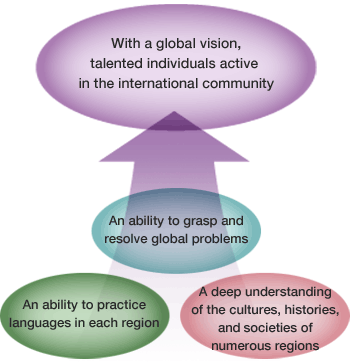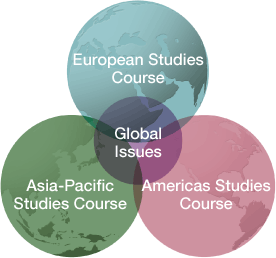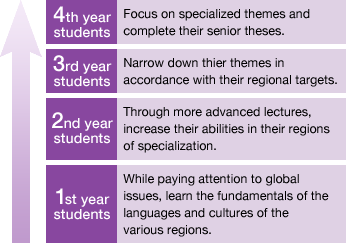Characteristics of the Faculty
Why study Global and Regional Cultures now?
Deeply understanding the frames of reference of the local, connecting to the ability to accurately grasp the ongoing globalization of the world
In recent years in the media, the phrase, ‘it is necessary to think from a global perspective’ has come to inform our experience. Most global problems arise from regional problems such as conflicts between cultures, races, or economies. Consequently, in order that we accurately grasp global problems, it is indispensable that we deeply understand the issues and cultures concerning local regions.
Faculty Ambitions
| 1 | Learn about the contemporary problems of the world's cultures, histories, and societies. | 2 | Gain the thorough understanding of regions necessary to resolving their problems. |
|---|---|---|---|
| 3 | Acquire the practical foreign language abiities necessary to contribute to the international community. | 4 | Cultivate an interest in languages other than English and utilize them to better understand other regions. |
The Aims of the Faculty of Global and Regional Studies

This faculty is concerned with foundational interdisciplinary knowledge about regional cultures, histories, and societies, studying contemporary issues from a global perspective. Concurrent with this study is the cultivation of practical language abilities. The objective of the faculty is to develop students’ abilities to identify and solve problems through four years of study, enabling them to serve actively in international society.
Beginning with an understanding of the regions, enquire into diverse global issues

The Faculty consists of three courses (European Studies, Asia-Pacific Studies, Americas Studies), one of which is selected by the prospective student. Though distinctive in their social formation, these three regions influence on one another in their development. To understand contemporary society, while grounded in these major courses, students also learn transregional phenomena and problems (global issues).
Cultivate ability over four years

The curriculum takes a multi-disciplinary and step-by-step approach to study about the various regional cultures, histories, societies, global problems, and foreign language learning. A diverse teaching staff provide an omnibus of lectures, Freshman Seminar which introduces methods of study, and Junior and Senior Seminars which deepen research through discussion.
Languages which can be studied in the faculty
| 12 Languages | English | German | French | Spanish |
|---|---|---|---|---|
| An objective is hte acquisition of two foreign languages. According to further ambition, additional languages may be studied. | Chinese | Russian | Korean | Indonesian |
| Turkish | Portuguese | Arabic | Italian |
|
Characteristics of the Faculty Overseas Training Learning Environment |